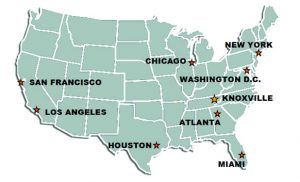At the Port of Entry
At the port of entry into the U.S., if requested, present the letter mailed to you, your tourist visa and passport. The immigration officer may also ask to see financial documents.The immigration officer will stamp your arrival and departure card (the white I-94 that you completed on the plane). The officer will keep the top part and staple the bottom part inside your passport. Do not lose this card.
IMPORTANT: Some airlines/airports will issue a pre-printed electronic I-94 that looks like a boarding pass.
» Learn more about Admission into the U.S.

Participants should try to fly into Knoxville’s McGhee-Tyson Airport (TYS). Most international flights from Europe arrive in Atlanta, New York, Chicago, or Washington, DC, with flights from Asia coming into Los Angeles and flights from Latin America flying into Houston or Miami. Flying into these major cities usually means available Knoxville connections from international flights.
Alternatives to get here include flying to a larger airport and then finding a low-cost airline flight into Knoxville or surrounding areas. Nearby airports include:
- Nashville: Nashville International Airport (BNA), 155 miles
- Atlanta: Hartsfield-Jackson Atlanta International Airport (ATL), 163 miles
- Charlotte: Charlotte Douglas International Airport (CLT), 174 miles
IMPORTANT: Due to increased security measures at US airports, expect long delays at immigration and security checkpoints. We advise that you schedule long layovers (at least four hours) between flights at your port of entry to reduce the risk of missing your connection flight to Knoxville.
Getting to Campus
We recommend taking a taxi from the airport to the UT campus. Ask to be taken to Laurel (Laurel Hall) Residence Hall, 1615 Laurel Avenue, Knoxville, TN 37916. Taxi fare will be about $35 to $40.
Feel free to review and talk to a taxi company in advance of your arrival.
If a friend is meeting you, be sure to pick a meeting place and stick to it. Give an alternative meeting place, just in case plans must be altered. Two of the best meeting places are at the luggage carousel, also known as “baggage claim,” and outside the doors of the carousel (if your friend does not want to park and meet you inside).
Please note that the luggage carousels at the airport are often far from the gate, so follow the signs for “baggage claim.” Usually, you will arrive on the second floor, and the baggage pick-up carousels are located on the first floor.
What to Bring
Classroom materials. Every set of materials you need will be provided by the program, and some other materials will be available either online or at the library. Basically all you need to bring is your laptop computer. If you don’t want to bring it or you want to update it, you can buy one on campus for a reasonable price.
Clothing. Knoxville culture is pretty casual, and UT students dress casually for class. You should bring comfortable clothing. There are also several stores near campus where you may shop for new clothing.
Knoxville weather is relatively unpredictable, but in the summer, you should expect very warm to hot weather, with the occasional rain and thunderstorm. Average temperatures can range from 15°C to 40°C.
There may be special occasions when business or formal attire should be worn, such as when you may be asked to make classroom and final presentations, as well as for special social functions.
Toiletries. Americans are very sensitive about hygiene, and they go out of their way to prevent body odor of any kind. Thus, it is common here to use antiperspirants, deodorants, cologne, perfume, aftershave, mouthwash, and scented or deodorant soaps.
Linens and bath articles. By official disposition, furniture is provided at the apartments (including a bed mattress), but not sheets and towels. Please consider this if you decide to bring your own (not recommended), or if you want to buy a set at a local department store (recommended).
Special items. It is also a good idea to bring a bilingual dictionary and other reference books in your native languages, just in case.
Security and Medical Matters
Medical conditions and medication. If you have a medical condition, you should check with your doctor for advice and guidance. If necessary, you should also carry a thirty-day supply of prescription medication along with a copy of your prescription giving both the generic and trade names. Ensure that such medicines are kept in their original containers. If your medicine is unusual, check whether it is available in the United States before you leave your home country and make preparations to have the medication shipped to you if allowed under US customs law.
For any medical condition, it is also a good idea to bring a summary of your medical history, including diagnosis, treatment, and prognosis.
Health insurance. You are required to bring proof of health insurance provided by your university or an external provider. In the case of an emergency, UT Medical Center and Fort Sanders Regional Medical Center are minutes away from campus. Make sure your insurance plan will cover treatment at any of these two hospitals in case of emergency.
Other insurance. Theft, loss of luggage, and flight cancellations are possible and can cause disruptions in your travels. You may wish to purchase a travel insurance package that will help you in the event of such inconveniences.